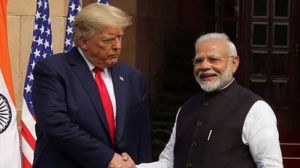No fee hike in Delhi schools
NEW DELHI, OCT 31: Slamming the Delhi Government for its failure to prevent commercialisation of public schools, Delhi High Court has appoin...

NEW DELHI, OCT 31: Slamming the Delhi Government for its failure to prevent commercialisation of public schools, Delhi High Court has appointed an independent statutory committee headed by Justice (Retd.) Santosh Duggal to look into the issues of hike in tuition fee and other charges, but refused to permit any further increase in the fee.
The Delhi Abhibhavak Mahasangh (DAM), a body fighting for rationalisation of tuition fee by private schools in the capital today welcomed the decision of Delhi High Court restraining schools from increasing their fee further.
Welcoming the provision of bringing nursery education within the ambit of the act regulating private schools in the city, DAM president Vijender Kumar said the court had saved parents from paying exorbitant amounts in the name of various funds at the time of admission.
By upholding the government directions of September 10, 1997 restricting the registration fee to Rs 25, admission fee to Rs 200 and security money to Rs 500, the court has rightlyrejected the contentions of various schools which challenged the government order, DAM president said.
The High Court had, on December eleven, permitted the private unaided public schools to hike the fees by 40 per cent on the fee charged for the month of March.
In a 90-page judgement of far reaching significance delivered on Friday, a Division Bench comprising Acting Chief Justice Y K Sabharwal and Justice C K Mahajan, restrained the schools from taking donations connected with the admission of the ward and fixation of the tuition fee for recovery of capital expenditure to be incurred on the properties of the society.
“The schools/societies can take voluntary donations not connected with the admission of the ward,” the judgement said.
The Bench further restrained the management of the schools from transferring the funds from the school to the society or from one school to another, which was prohibited under the Delhi School Education Act. The judges ordered the Delhi Government to finalise withinten days the terms and conditions including fees/honourarium payable and other facilities to be provided by the state government to the chairperson of a three-member committee.
The court gave the power to the chairperson to nominate two persons — one with the knowledge of accounts and second from the field of education, in consultation with Chief Secretary of the Delhi Government. The judges said the committee would determine fee and other charges payable by students of individual schools with a view to eliminate the element of commercialisation.
In view of these facts, they said, “we do not think that it would be desirable at present to permit any further increase than what has already been permitted by the December order. We would, therefore, extend the afore-quoted order dated December eleven till decision of cases of individual schools by the committee appointed by this judgement.”
The judgement came on a bunch of petitions filed in support and against steep hike in tuition fees and other chargesagainst unaided private schools.
Noting the tendency to turn the schools as profit making institutions, the judgement said it was the obligation of the administrator and director of education to prevent commercialisation and exploitation in private unaided schools including schools run by minorities. No permission from director of education was necessary before or after fixing tuition fee. In case such fixation was found to be irrational and arbitrary, there were ample powers with the director of education under the act to issue directions to school to rectify it before resorting to harsh measures.
Saying that the limited control of the government can only be with a view to safeguard against commercialisation and exploitation, the judges had a word of appreciation as well for the private schools.





- 01
- 02
- 03
- 04
- 05








![Kadapa, [Andhra Pradesh], 27 May (ANI): Andhra Pradesh Chief Minister N Chandrababu Naidu and state Minister Nara Lokesh in conversation during the Telugu Desam Party's (TDP) annual three-day Mahanadu conclave, in Kadapa on Tuesday. (ANI Photo)](https://images.indianexpress.com/2025/05/tdp.jpg?w=300)

















